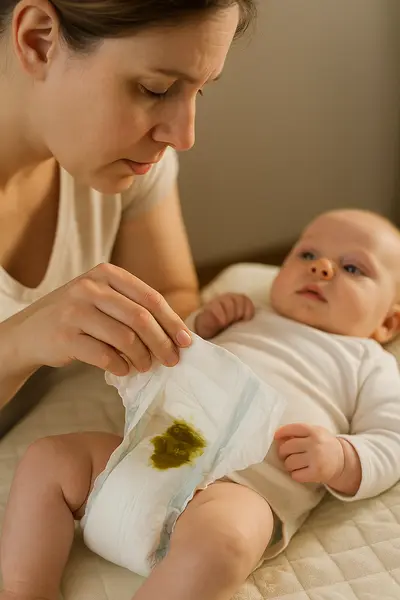- Why Does My Baby Have Green Poop?
- What Does Green Baby Poop Mean?
- When to Worry About Green Baby Poop
- How to Treat and Prevent Green Poop
- Supporting Digestive Health in Babies
- Key Takeaway: Trust Your Observations
Why Does My Baby Have Green Poop?
Noticing green poop in your baby’s diaper can be a surprising and even worrying experience. Many parents immediately wonder: “Why does my baby have green poop?” The truth is, green baby poop is often harmless and may be part of normal development. However, in some cases, it may signal dietary changes or mild illnesses. Fortunately, understanding the causes and knowing when to take action can ease your mind.
What Does Green Baby Poop Mean?
The color of a baby’s stool can reveal important information about their health. Green poop can range in shade from pale green to dark olive and is influenced by various factors such as age, diet, and digestion speed. Therefore, knowing the underlying cause is essential for peace of mind.
Common Causes of Green Poop in Babies
Several typical conditions can explain why does my baby have green poop. Let’s take a look at the most frequent reasons:
Transition from Meconium
In newborns, the first few stools are dark green and sticky, known as meconium. As they begin feeding, this stool gradually transitions to a lighter green before turning yellow or brown.
Diet of Breastfeeding Mothers or Solids
Babies may produce green stools if the breastfeeding mother consumes iron-rich foods or green vegetables. Likewise, babies eating spinach, peas, or beans often pass green poop as well.
Iron Supplements or Fortified Formula
If your baby is taking iron supplements or drinking iron-fortified formula, it may result in green-colored stools. Thankfully, this is usually harmless.
Foremilk-Hindmilk Imbalance
If your baby is breastfeeding but switching breasts too frequently, they may get more foremilk (sugary and less fatty) and not enough hindmilk (rich and fatty). As a result, this can cause frothy, bright green stool.
Diarrhea or Fast Transit Time
When poop moves quickly through the intestines, bile doesn’t have enough time to break down fully, leaving a green tint. For this reason, diarrhea caused by viral infections is a common cause.
Less Common but Concerning Causes
Infections
Viral or bacterial infections like rotavirus or Salmonella can cause green poop, often accompanied by fever, vomiting, or fussiness. In such cases, medical attention may be necessary.
Food Allergies or Intolerance
Allergies to cow’s milk or soy protein may cause green, mucusy, or bloody stools in some infants. Additionally, fussiness or digestive discomfort might appear.
Phototherapy
Babies treated with phototherapy for jaundice might have greenish stools due to increased bilirubin breakdown. This is typically temporary.
When to Worry About Green Baby Poop
Most of the time, green poop is not a cause for concern. However, contact your pediatrician if:
- The green poop is watery and lasts more than 24 hours (possible dehydration)
- It’s accompanied by blood, fever, or vomiting
- Your baby seems unusually fussy or lethargic
- Poop appears white, gray, or black, which may indicate liver or bleeding issues
Always trust your instincts. If something seems off, it’s better to consult a doctor.
How to Treat and Prevent Green Poop
Keep Baby Well-Hydrated
In cases of diarrhea, ensure your baby continues breastfeeding or formula feeding. Moreover, electrolyte solutions may be needed for older infants.
Adjust Feeding Patterns
To prevent foremilk-hindmilk imbalance, try feeding on one breast per session to allow the baby to get more hindmilk. This small adjustment can make a big difference.
Watch for Dietary Triggers
If you suspect green foods or iron supplements are the cause, monitor the pattern carefully. However, never stop supplements without consulting your pediatrician.
Maintain Hygiene to Prevent Infections
Proper handwashing and clean food preparation reduce the chance of bacterial transmission, especially when babies start crawling. Preventive care is key.
Supporting Digestive Health in Babies
Healthy digestion supports better stool patterns. Exclusive breastfeeding for the first six months helps prevent infections and digestive issues. In addition, clean feeding practices and appropriate WASH (Water, Sanitation, and Hygiene) behaviors also protect babies from illness.
Key Takeaway: Trust Your Observations
In most cases, the answer to “why does my baby have green poop?” lies in benign dietary or developmental changes. Pay close attention to your baby’s overall health, behavior, and symptoms. If anything feels off or symptoms persist, reaching out to your pediatrician is always a safe and reassuring choice.
The following post may interest you
How to Treat Constipation in Babies?
How Often Should I Feed My Newborn?
Source:
Water, sanitation, and hygiene (WASH), environmental enteropathy, nutrition, and early child development: making the links
https://nyaspubs.onlinelibrary.wiley.com/doi/abs/10.1111/nyas.12330
Undernutrition as an underlying cause of child deaths associated with diarrhea, pneumonia, malaria, and measles
https://www.sciencedirect.com/science/article/pii/S0002916522034979
Exclusive Breastfeeding Reduces Acute Respiratory Infection and Diarrhea Deaths Among Infants in Dhaka Slums
https://publications.aap.org/pediatrics/article-abstract/108/4/e67/67315

